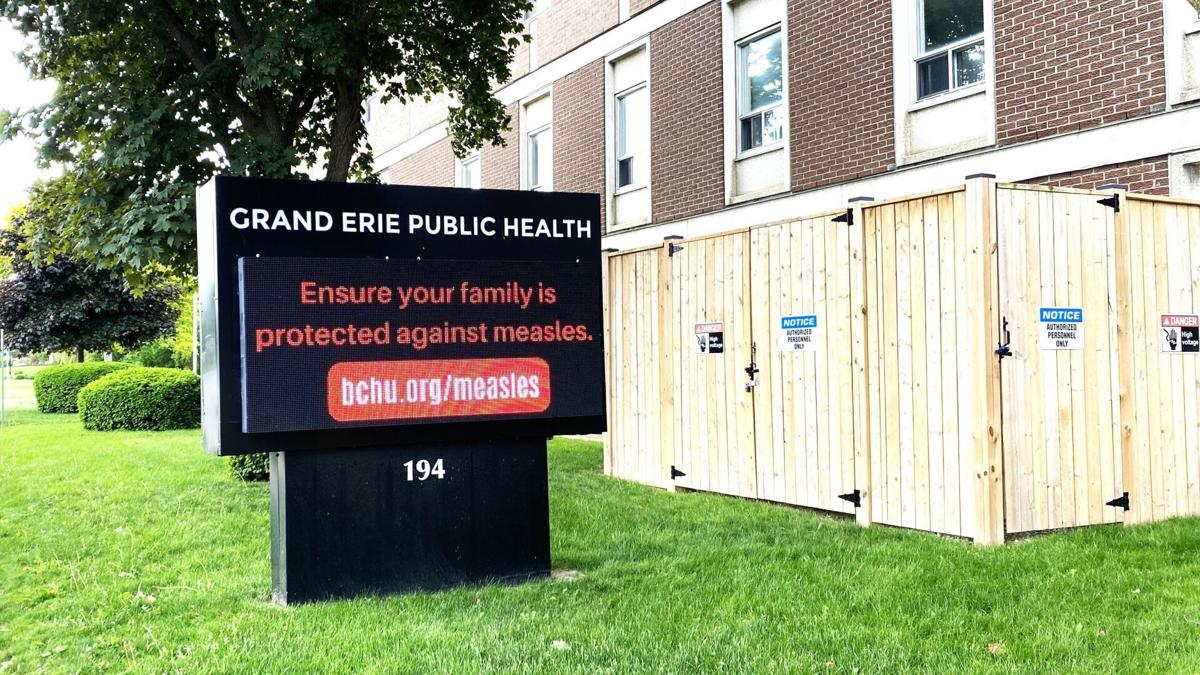Last week, Grand Erie Public Health warned of a potential measles exposure at Brantford General Hospital’s (BGH) labour and delivery unit.
The same day, Ontario’s top doc reported there had been a premature infant that died from measles and other health complications, as well as six cases of babies with measles at birth.
What does that mean for people preparing to give birth?
The Spectator asked Brant Community Healthcare System (which oversees the hospital and the Willett Urgent Care Centre) and Dr. Sarah Khan, an associate medical director with Hamilton Health Sciences.
Preventive measures
Brant Community Healthcare System (BCHS) has implemented “a range of protective and preventive measures” to keep people safe when visiting the hospital, a spokesperson told The Spectator.
This includes placing all patients with symptoms of measles in a negative-pressure room with precautions for contact until four days after the onset of rash.
Patients exposed to measles who are considered non-immune are placed in a negative-pressure room from five days after exposure until Day 21.
Health-care providers wear PPE, including a fitted N95 respirator mask, and all BCHS employees born after 1970 are required to have two doses of the measles vaccine.
BCHS and Grand Erie Public Health keep in touch to ensure they’re aware of people with symptoms who may go to the hospital for care, or suspected cases in hospital the health unit should follow up on.
“We strongly encourage patients experiencing symptoms to call ahead to the emergency department to support the safe management of the triage process,” the spokesperson said.
What do pregnant people need to know?
Since the outbreak began in the fall, Public Health Ontario has recorded six cases of congenital measles — meaning a diagnosis in the first 10 days of life.
But Khan said as long as a mother is vaccinated, the risk of a baby catching measles is quite low.
What happens if you catch measles while pregnant?
During pregnancy, the fetus is almost like a “foreign tissue” and the body’s immune system has to “contain itself” so as not to attack it. This can result in “a higher risk of more severe infections as the immune system’s guard is down,” Khan said.
In pregnancy, complications of measles include secondary bacterial infections like severe pneumonia or hepatitis because of the effect of the virus on the immune system.
Someone who is pregnant with measles might need intensive care for help with breathing and help with keeping blood pressure stable.
They’re also at risk of miscarriage, a stillbirth, intrauterine growth restriction (where the baby doesn’t grow properly), or premature labour and birth, Khan said.
What risk does measles pose to the fetus?
Congenital measles can lead to pneumonia, hepatitis, long-term scarring on the lungs, and a severe brain infection called sclerosing panencephalitis, which can be fatal.
But prematurity itself comes with “a host of complications to the infant,” depending on how early they’re born, Khan said.
If someone is vaccinated, does that protect their baby?
“Generally speaking,” if someone is vaccinated and delivering at term, “the risk of that infant acquiring infection after being born is quite low because mom’s antibodies cross the placenta throughout pregnancy,” Khan said.
So even if a baby is exposed to someone with measles after they are born, their risk is “much lower” compared to a baby born to someone with no previous measles vaccination.
Nothing is a “zero risk,” but it’s “a significant risk reduction,” Khan said.
What if someone is pregnant and unvaccinated?
Someone who is unvaccinated and has been exposed may be able to get passive immune prophylaxis, to reduce the risk of severe disease.
It basically means “giving antibodies from donor pooled blood product” that give the “same kind of immunity” someone gets when they are vaccinated and their own body produces those antibodies, Khan said.
If infants less than six months are exposed to measles they would also be offered this.
Is a baby at risk of getting measles if they’re born in a hospital where there have been exposures?
A hospital works to mitigate risk by screening for symptoms, testing people who are at risk or exposed, managing visitors, and through patient placement.
“For example we would place infants who have been exposed in a different space of the hospital that still provides neonatal intensive care but reduces the risk of transmission to other high-risk infants,” Khan said.
How much should people in Hamilton worry?
Khan said while they “do see cases from time to time” in the Hamilton area, it hasn’t been hit as hard as neighbouring communities.
“And that is likely because we have higher rates of vaccination among our general population,” she said.
“I don’t think we’re at a state of panic,” but this is “a wake-up call” to get more people get vaccinated “to protect exactly the populations that we’re now starting to think harder about” such as babies, pregnant women, and immunocompromised populations, she said.





